The United Methodist Church was created on April 23, 1968, when the Evangelical United Brethren Church and The Methodist Church merged at General Conference in Dallas, Texas.
A timeline of highlights of the journey of The United Methodist Church includes notable events and actions of the church since 1968.

Evangelical United Brethren Church Bishop Reuben H. Mueller (left) and Methodist Bishop Lloyd C. Wicke at Uniting Conference 1968. Photo courtesy of Archives and History.
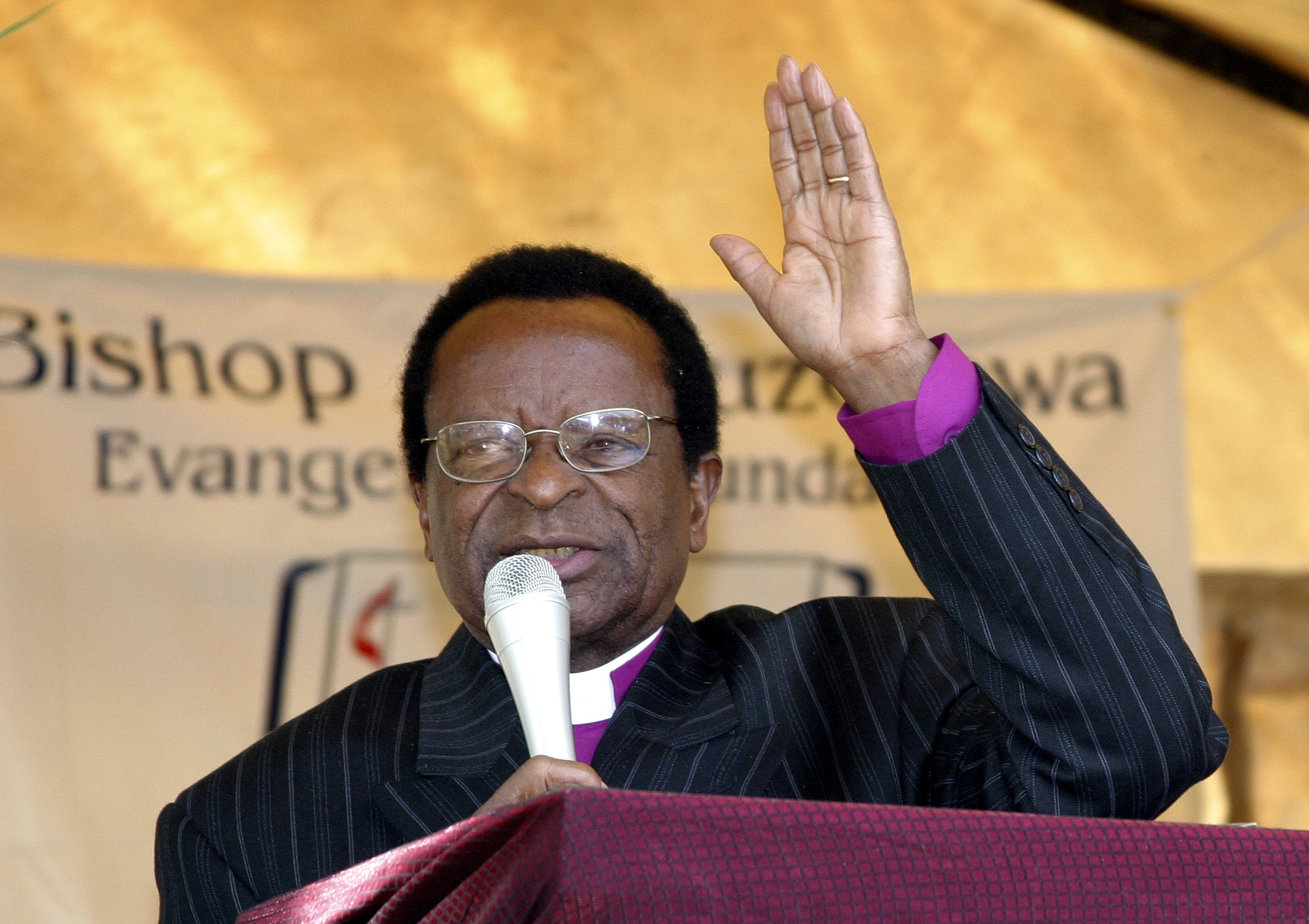
Bishop Abel T. Muzorewa speaks at 2005 celebration in Zimbabwe honoring his 60 years of ministry. Muzorewa died in 2010. Photo by Kathy L. Gilbert, UMNS.
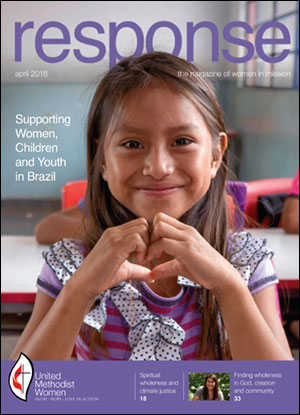
The April 2018 cover of Response magazine, a publication of United Methodist Women.

Freddie Bermudez (left), Francisco Nolla (center) and Angélica M. Rivera-Morales at 2012 MARCHA meeting. Photo by Mike DuBose, UMNS.

Barbara Thompson speaks during General Conference 1976. Thompson was elected the first president of General Commission on the Status and Role of Women in 1972. Photo courtesy of Archives and History.
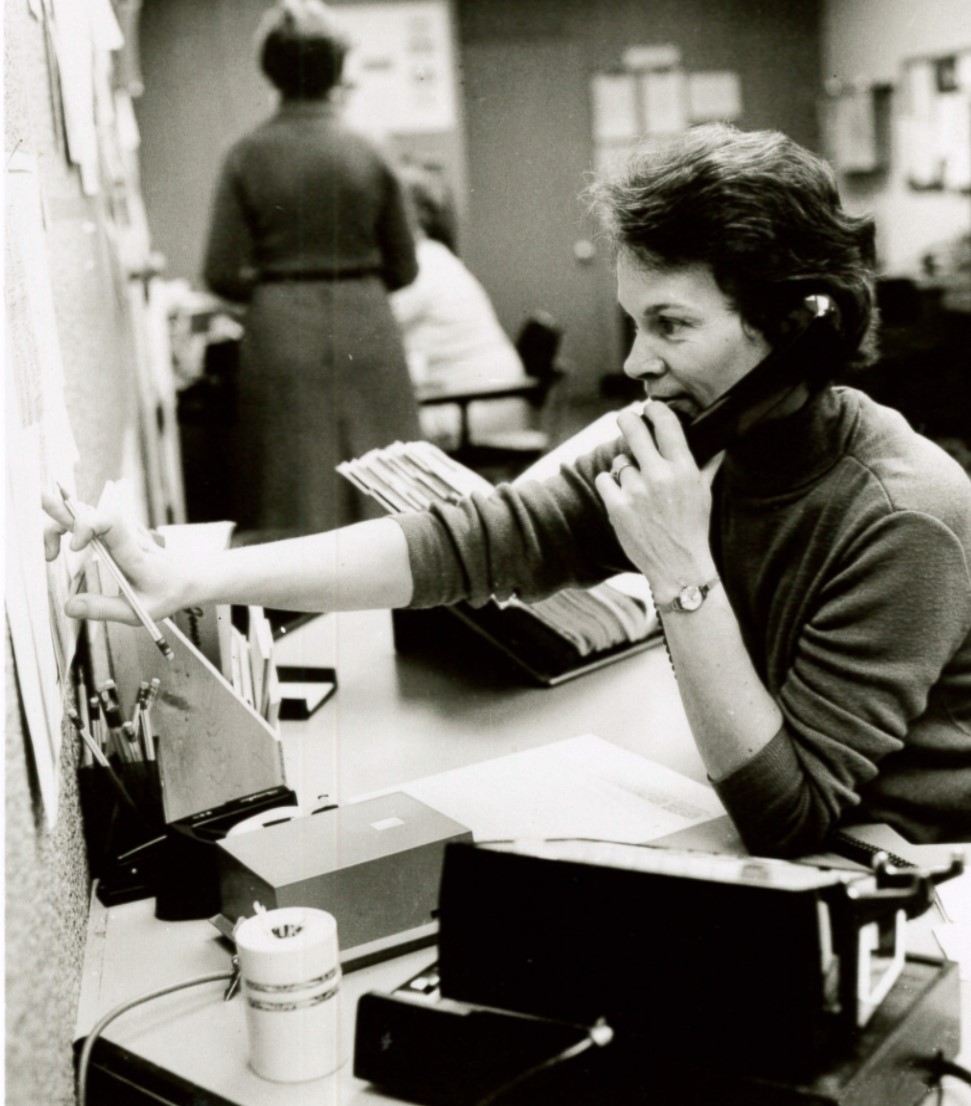
Long-time InfoServant Woodley McEachern works at her desk in 1978. Photo courtesy of United Methodist Communications.
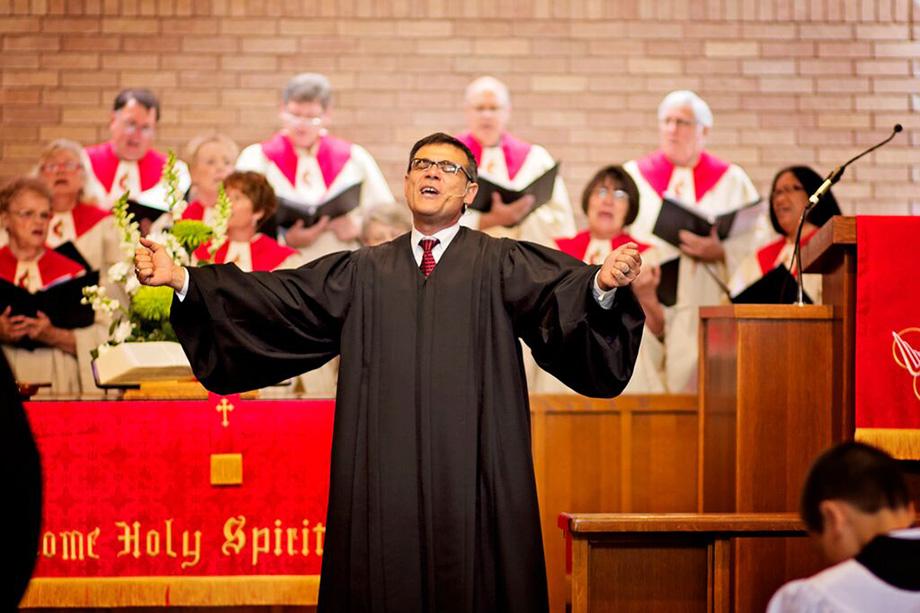
The Rev. Arturo "Artie" Cadar is a full-time local pastor appointed to lead CrossRoads United Methodist Church in Houston. Photo courtesy of the Rev. Arturo Cadar.
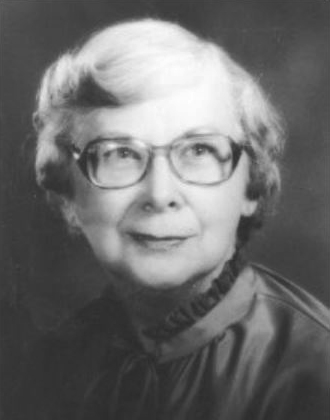
Marjorie Matthews (1916-1986) was the first woman elected bishop in 1980. Photo courtesy of Archives and History.
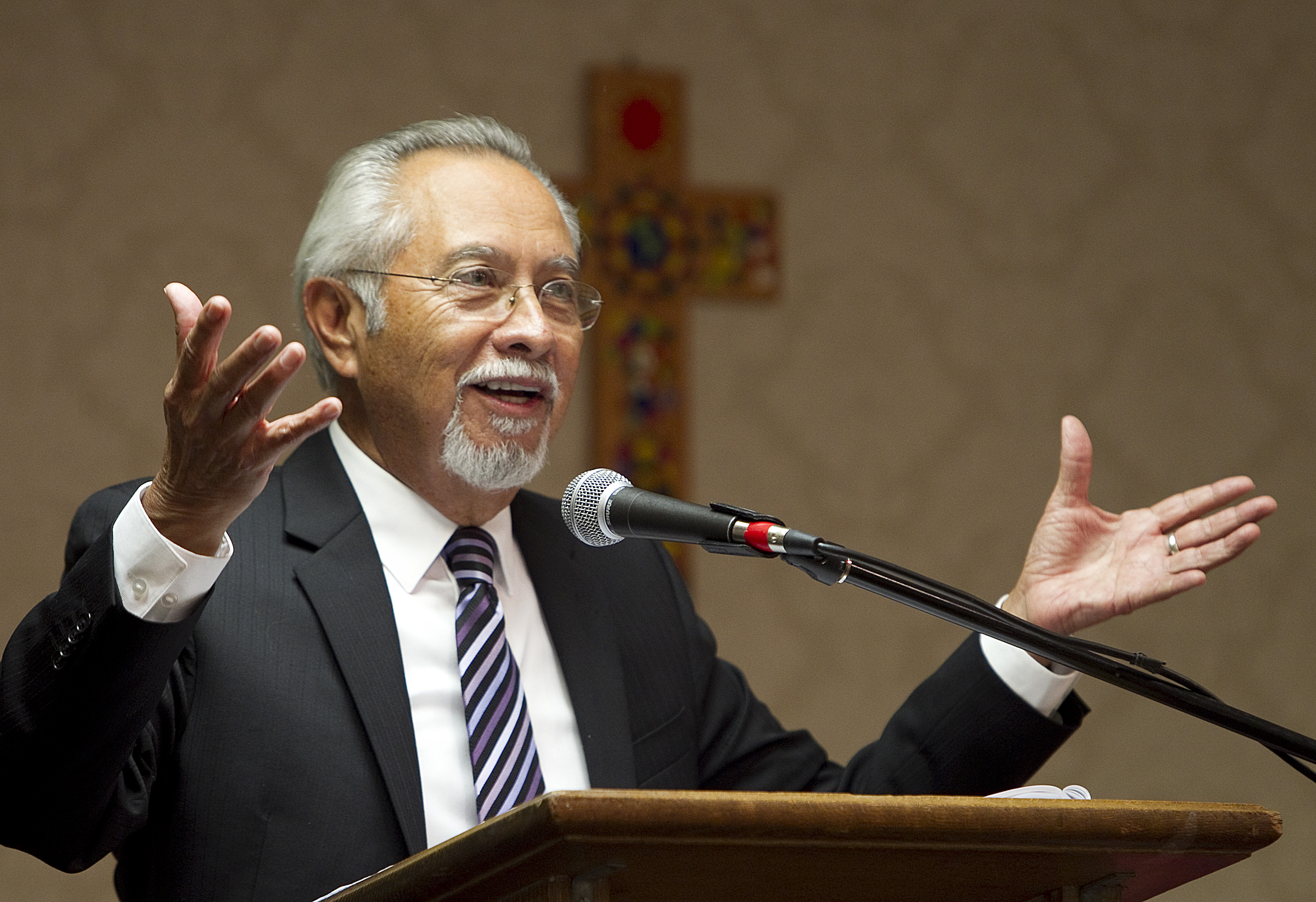
Bishop Elías Galván welcomes participants to the 2012 MARCHA meeting. Photo by Mike DuBose, UMNS.
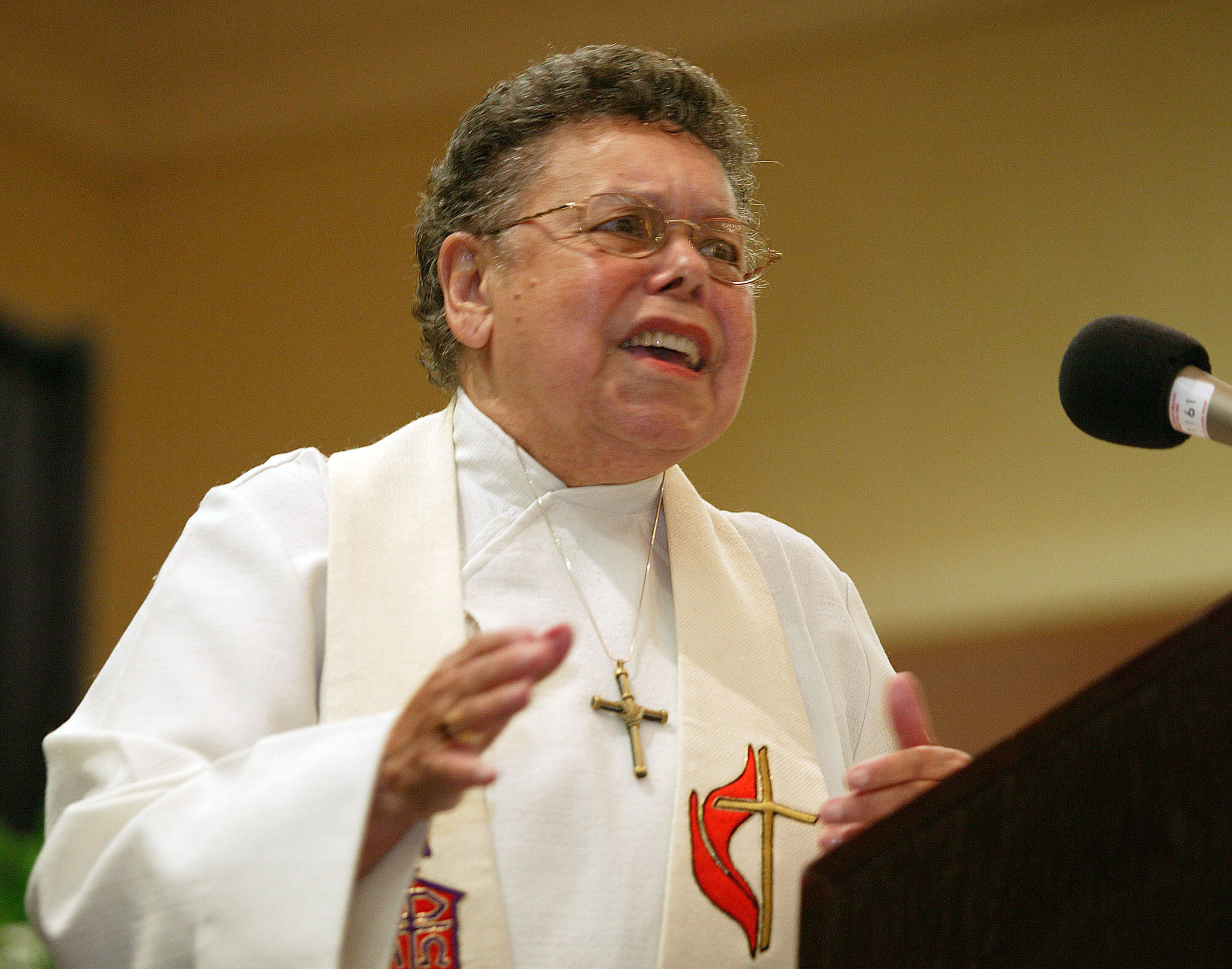
United Methodist Bishop Leontine Turpeau Current Kelly preaches at the first reunion of the former Central Jurisdiction of the Methodist Church in 2004. Kelly died in 2012. Photo by Mike DuBose, UMNS.
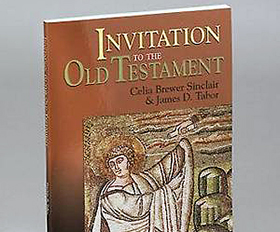
"Invitation to the Old Testament," a short-term Disciple Bible Study publication. Image courtesy of Cokesbury.
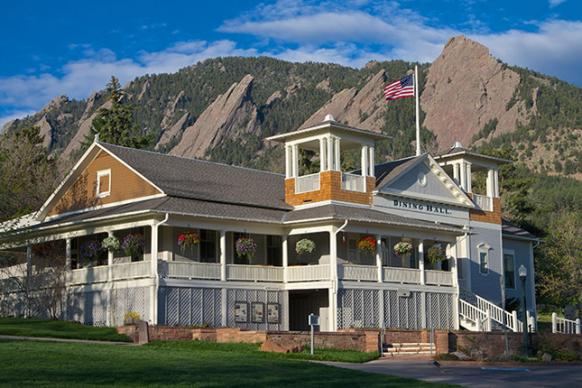
The Dining Hall at Colorado Chautauqua National Historic Landmark. Photo by Jonathan B. Auerbach.
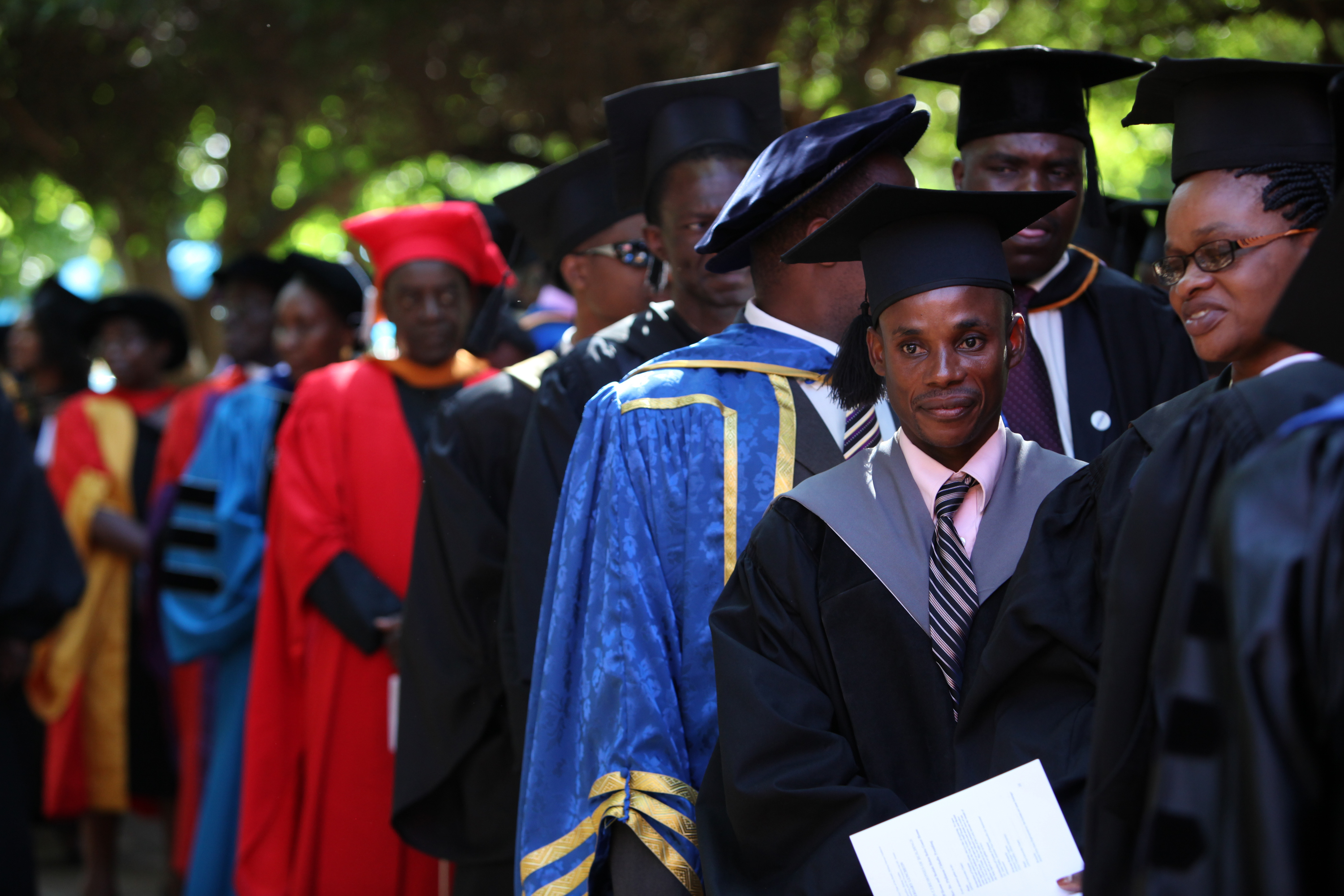
The 20th anniversary celebration of Africa University, March 23, in 2013. Photo by Kathleen Barry, UMNS.
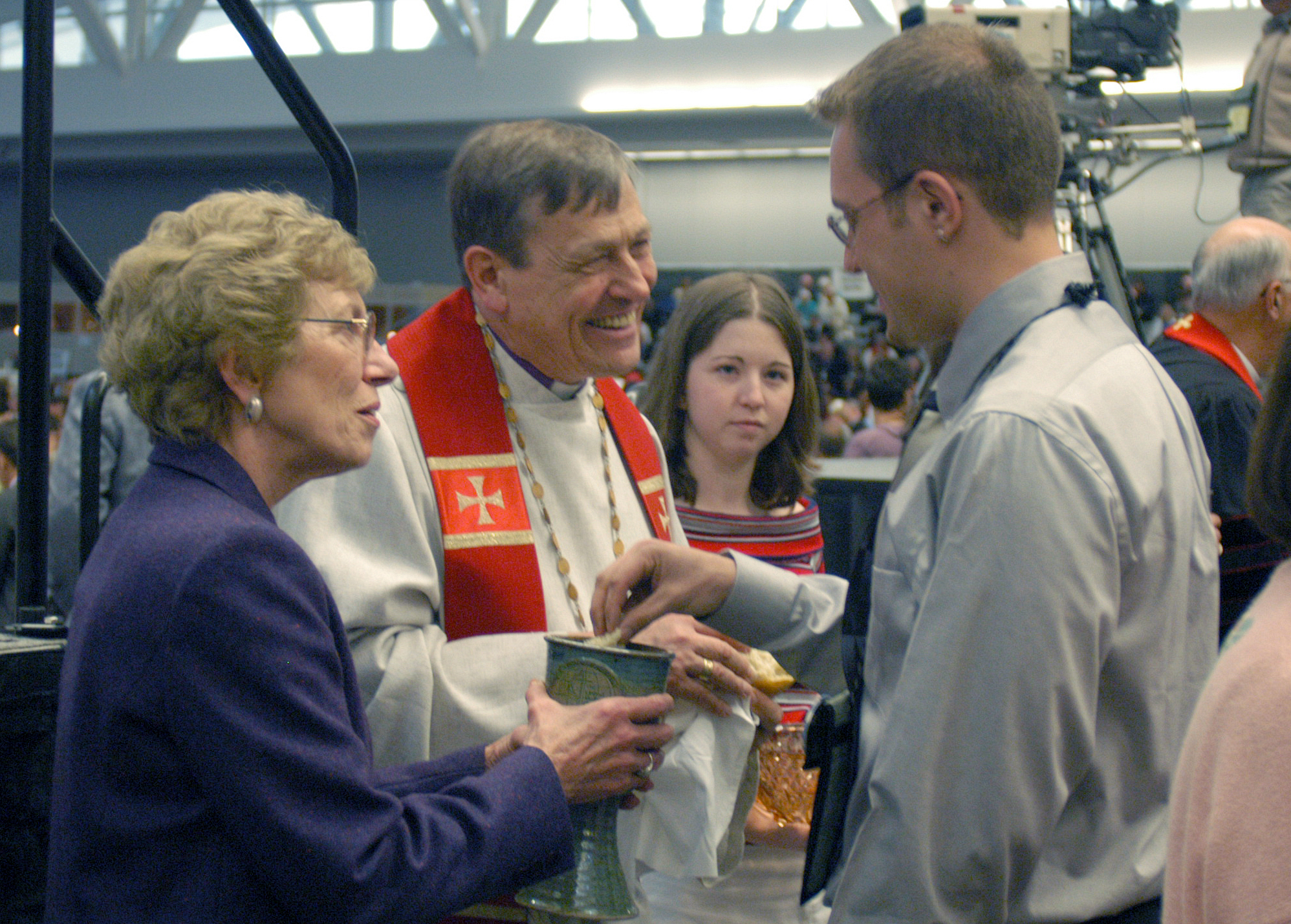
United Methodist Bishop Ruediger R. Minor (center) serves communion at General Conference 2004. Photo by John C. Goodwin, UMNS.
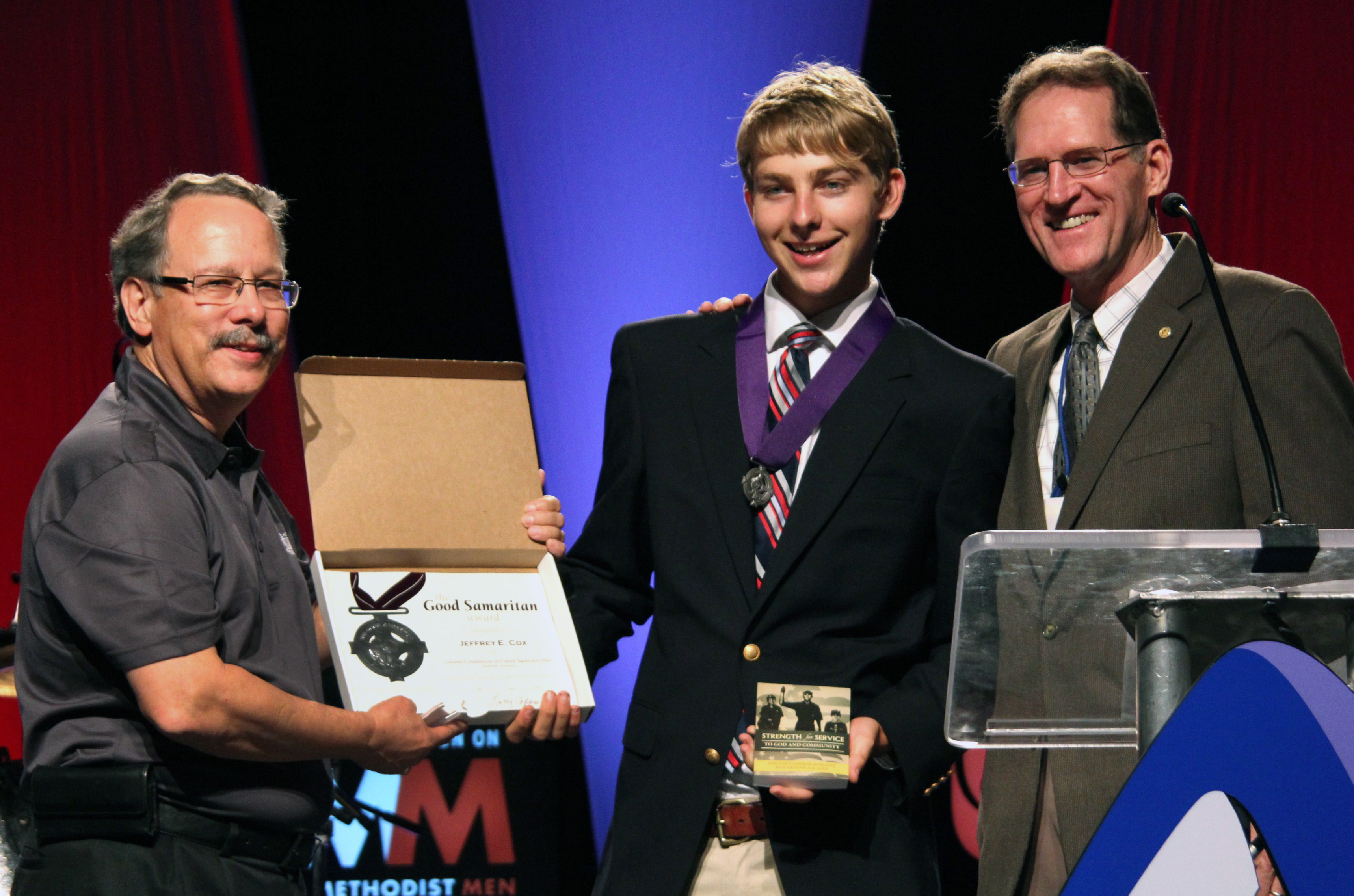
Jeff Cox (center) receives the Good Samaritan Award for his 9/11 Eagle Scout Project. Presenting the award are Gil C. Hanke (left) and Larry Coppock for United Methodist Men. Photo by Bob Vogt.
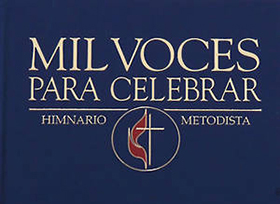
"Mil Voces Para Celebrar" is a Spanish-language hymnal. Photo courtesy of Cokesbury.
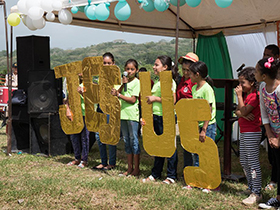
Children participate in the celebration of placing the cornerstone for Casa de Paz United Methodist Church, San Pedro Sula, Honduras, 2017. Photo by Kathy L. Gilbert.
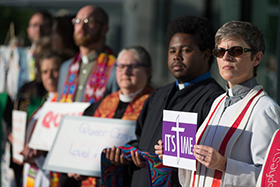
Supporters of LGBTQ clergy line the entryway to the 2016 General Conference. Photo by Mike DuBose, UMNS.
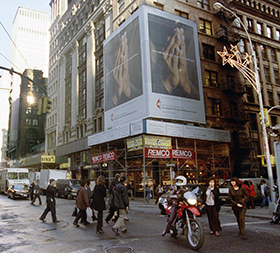
United Methodist Communications' billboard in Manhattan, two blocks from ground zero. Photo by John C. Goodwin, UMNS.
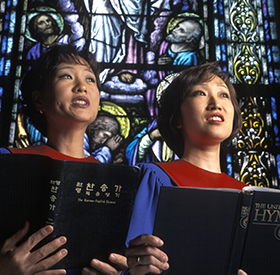
Two women sing from the Korean hymnal. Photo by Mike DuBose, UMNS.
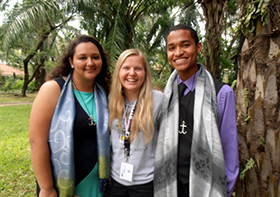
2014 delegates to Global Young People's Convocation in Philippines. Photo courtesy Rich Rasmussen, the Florida Annual Conference.
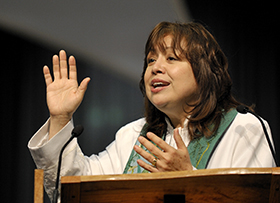
Bishop Minerva G. Carcaño preaches during morning worship at GC 2008. Photo by Paul Jeffrey, UMNS.
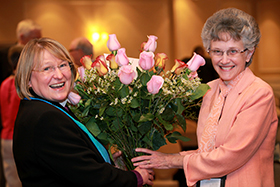
Bishop Rosemarie Wenner (left) receives roses from Bishop Peggy Johnson after a "passing of the gavel." Photo by Kathleen Barry, UMNS.
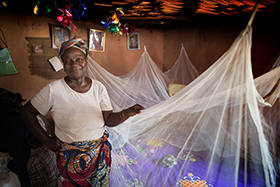
Matilda Ndanema displays insecticide-treated mosquito net she received from the Imagine No Malaria campaign. Photo by Mike DuBose, UMNS.
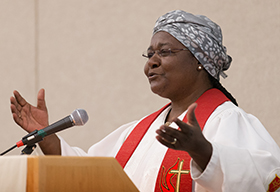
Bishop Joaquina Filipe Nhanala helps lead a worship service during the 2016 General Conference. Photo by Mike DuBose, UMNS.
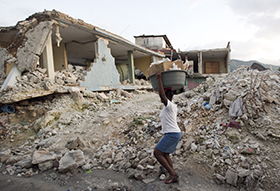
Many neighborhoods in Port-au-Prince, Haiti, remain devastated, a year after a deadly earthquake struck in 2010. Photo by Mike DuBose, UMNS
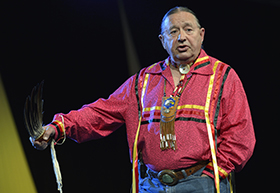
The Rev. George Tinker preaches "Act of Repentance" at 2012 General Conference. Photo by Paul Jeffrey, UMNS.

A young boy leaves a food distribution by UMCOR carrying food for his family following Typhoon Haiyan in Dagami, Philippines. Photo by Mike DuBose, UMNS
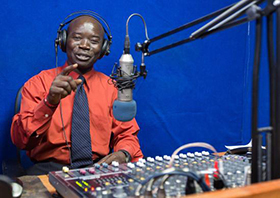
Edward L. Massaquoi broadcasts on ELUM, The United Methodist Church's radio station in Monrovia, Liberia. Photo by Mike DuBose, UMNS.
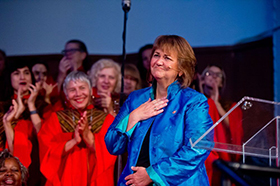
United Methodist Bishop Karen Oliveto says goodbye to Glide Memorial United Methodist Church family after being elected bishop in 2016. Photo by Alain McLaughlin Photography Inc.
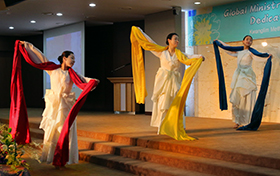
Dancers performs at 2017 dedication service for new Asia regional office of United Methodist Global Ministries. Photo by Jacob Lee, UMNS.
1968
- The Methodist Church and the Evangelical United Brethren Church merge to form The United Methodist Church at the Uniting Conference in Dallas.
- The Central Jurisdiction is eliminated with a target of 1972 for full elimination of segregation within the church.
- The General Commission on Religion and Race and the General Commission on Archives and History are created.
- The Rev. Roy C. Nichols is the first African-American elected to the episcopacy after the dissolution of the racially segregated Central Jurisdiction and the creation of The United Methodist Church.
- The Uniting Conference approves the development of an official insignia for the new church; the cross and flame logo is adopted later in 1968.
- Black Methodists for Church Renewal, one of the denomination's five U.S.-based racial-ethnic caucuses, is formed.
- A single conference for sub-Saharan Africa — Africa Central Conference — combines the conferences from the former Methodist Church: Angola, Liberia, Mozambique, Rhodesia (Zimbabwe) and Zaire (Democratic Republic of Congo).
- The Rev. Abel T. Muzorewa is the first indigenous pastor elected bishop for Rhodesia (Zimbabwe). He later served as the first black prime minister of the soon-to-be-independent Zimbabwe.
- The Methodist Church in Germany joins with the German Evangelical United Brethren Church to create the "Evangelisch-methodistische Kirche," also known as the Germany Central Conference, of The United Methodist Church.
1969
- Methodist churches in Argentina, Chile, Cuba, Malaysia-Singapore and Pakistan become autonomous.
- United Methodist Church's Women's Division begins publishing Response magazine.
1970
- Because of political developments in East and West Germany, two central conferences were created to serve United Methodists there.
- A special session of the General Conference completes the work of organizing The United Methodist Church.
1971
- MARCHA (Methodists Associated Representing the Cause of Hispanic Americans), one of the denomination's five U.S.-based racial-ethnic caucuses, is formed.
1972
- The newly adopted United Methodist Social Principles includes the first statement on homosexuality and recognizes divorce and the right of divorced people to remarry. The decades-long church debate on homosexuality begins. In The Book of Discipline, the sentence, "We do not condone the practice of homosexuality and consider it incompatible with Christian teaching," is added to the phrase, "Persons of homosexual orientation are persons of sacred worth." The Discipline also makes the first reference to homosexual unions: "We do not recommend marriage between two persons of the same sex."
- The Western Jurisdiction elects the Rev. Wilbur W. Y. Choy as the first Asian-American bishop.
- The Black College Fund is established to minister to individuals underserved by the U.S. system of higher education.
- The General Commission on the Status and Role of Women and the General Council on Finance and Administration are created.
- Reorganized church agencies form four general boards: Church and Society, Discipleship Ministries, Global Ministries and Higher Education and Ministry. Three agencies are combined to form United Methodist Communications.
1973
- The women's organizations in The United Methodist Church merge to form one inclusive organization with the name "United Methodist Women."
1974
- Garrett Theological Seminary (Methodist Church) and the Evangelical Theological Seminary (EUB) merge into Garrett-Evangelical Theological Seminary.
- InfoServ, the official United Methodist information service, launches.
1975
- The United Methodist Gay Caucus organizes in Evanston, Illinois.
1976
- The first 10 clergywomen delegates are elected to the United Methodist General Conference.
- A new category of "local pastor" is created for people who are not ordained. They are authorized to administer the sacraments within their church or churches.
- The HANA Scholars program is established to assist Hispanic, Asian, Native American and Pacific Islander students.
- The Ethnic Minority Local Church emphasis begins.
1977
- The Foundation for Theological Education is created to assist clergy doctoral studies.
- The Upper Room Living Prayer Center opens.
1980
- The North Central Jurisdiction elects the Rev. Marjorie Swank Matthews as the first woman bishop.
- Autonomous churches in Sierra Leone and Nigeria join The United Methodist Church. General Conference then authorizes the creation of a West Africa Central Conference, comprising Liberia, Nigeria and Sierra Leone.
- The Methodist Church in India becomes an affiliated autonomous church.
- The General Commission on Christian Unity and Interreligious Concerns is established.
- General Conference grants voting rights to delegates from the Oklahoma Indian Missionary Conference.
- The General Conference fails to add the phrase "no self-avowed, practicing homosexual therefore shall be ordained or appointed in The United Methodist Church" to the Discipline. The conference notes the denomination "has moved away from prohibitions of specific acts, for such prohibitions can be endless."
1984
- American Methodism marks the bicentennial of its evolution into a church that began at the 1784 "Christmas Conference" in Baltimore.
- The Western Jurisdiction marks three firsts in its episcopal elections. The Rev. Elias G. Galvan becomes the first Hispanic bishop; and the Rev. Leontine T.C. Kelly the first African-American woman bishop.
- General Conference reverses its 1980 decision and declares that "self-avowed practicing homosexuals" are prohibited from serving as clergy. The conference also inserts the phrase "fidelity in marriage and celibacy in singleness" regarding qualifications for ordination.
- The Evangelical Episcopal Church of Burundi joins The United Methodist Church, becoming part of the Africa Central Conference.
1986
- United Methodist bishops issue the "In Defense of Creation" letter opposing nuclear weapons.
1987
- The United Methodist Publishing House launches the Disciple Bible Study.
1988
- General Conference adopts The United Methodist Hymnal.
- Delegates approve the establishment of Africa University in Zimbabwe.
- General Conference approves a study of homosexuality to report to the 1992 General Conference.
1989
- The Chautauqua (New York) Institution, founded in 1874 as a teaching camp for Sunday school teachers, is designated a National Historic Landmark.
1990
- Fifty women serve as district superintendents in The United Methodist Church.
- The first issue of the Korean-language magazine, United Methodist Family, is published.
1992
- Africa University opens with 40 students from six African countries.
- General Conference creates the Communities of Shalom initiative in response to the Los Angeles riots.
- The United Methodist Book of Worship is authorized.
- General Conference approves the creation of the Congo (formerly Zaire) Central Conference.
- After the political reunification of Germany, two central conferences reunite into the Germany Central Conference.
- The Council of Bishops appoints Bishop Ruediger R. Minor from the former German Democratic Republic to oversee the rebirth of Methodist presence in the former Soviet Union.
- The Methodist Church in Russia is formally re-established when the First United Methodist Church in Moscow and the First United Methodist Church in St. Petersburg are legally registered.
1995
- The Theological Seminary of the United Methodist Church in Moscow is established.
- UMC.org, the denominational website, launches.
1996
- "By Water and the Spirit," the official statement on baptism, is adopted.
- The Rev. Minerva G. Carcaño is elected the first Hispanic clergywoman delegate to General Conference.
- Two separate, distinct orders of clergy – elders and deacons – are created.
- The General Commission on United Methodist Men is created as a separate agency.
- Disability Awareness Sunday is introduced as a designated churchwide special Sunday.
- General Conference adds three significant points to the church's position on homosexuality: a footnote defining "self-avowed practicing homosexual," a declaration that ceremonies to celebrate homosexual unions shall not be conducted by United Methodist clergy or in United Methodist churches and a call for the U.S. military not to exclude people from service "solely on the basis of sexual orientation."
- Bishops launch an Episcopal Initiative on Children and Poverty.
- The United Methodist Student Movement is established.
- The United Methodist Publishing House produces official Spanish-language hymnal, Mil Voces Para Celebrar.
1997
- The Board Global Ministries starts the United Methodist Mission in Honduras, making it the only United Methodist church in Latin America.
1998
- The Philippines marks 100 years of Methodism on the anniversary of the first Methodist service by the Americans in Manila.
2000
- Igniting Ministry, the first multifaceted national welcoming and advertising campaign, is launched.
- Find-A-Church, an online directory of churches, debuts.
- General Conference delegates participate in an act of repentance, confessing the sin of racism that has caused major divisions among American Methodists.
- General Conference votes to add to the Social Principles the language, "We implore families and churches not to reject or condemn their lesbian and gay members and friends."
- The Fund for Theological Education in Post-Communist Europe is created to support United Methodist clergy training.
- The United Methodist Church opens the Baltic Mission Center in Tallinn, Estonia, for training church leaders from the former Soviet Union.
- The Puerto Rico Methodist Church becomes fully autonomous.
- The United Methodist Publishing House produces the songbook, The Faith We Sing.
2001
- After the 9/11 attack in the U.S., United Methodist Communications sponsors a billboard near ground zero. Offering support and reassurance, it features an image of praying hands and a simple statement: "Fear is not the only force at work in the world today." More than 600,000 people see the billboard every day of its three-month presence.
- By Nov. 30, the United Methodist Committee on Relief receives a total of $22.3 million through general Advance specials. This includes "Love in the Midst of Tragedy," the church's special offering in response to the Sept. 11 attacks.
- The Judicial Council rules that the central conferences have jurisdiction over adaptations of the Discipline except for matters protected by The United Methodist Church constitution.
- Come, Let Us Worship, an official bilingual Korean-English hymnal of The United Methodist Church, is published.
2002
- Boris Trajkovski, president of Macedonia and a United Methodist, receives the World Methodist Peace Award.
2003
- The 300th anniversary of John Wesley's birth is celebrated.
- Korean-American United Methodists celebrate 100 years since their first worship gatherings in Hawaii.
2004
- General Conference adopts This Holy Mystery as the denomination's official statement on Communion.
- The General Council on Ministries is eliminated and the Connectional Table is formed.
- The United Methodist Church Global AIDS Fund is started with the goal of raising $8 million by 2008 to address the worldwide pandemic.
- The Global Education Fund is created to assist 748 Methodist schools, colleges, universities and seminaries in 69 countries.
- General Conference approves the Central Conference Pension Initiative.
- The Division on Ministries with Young People is begun.
- The Western Jurisdiction elects the Rev. Minerva G. Carcaño as the first female HIspanic bishop.
- Chargeable offenses related to homosexuality are added to the Discipline.
- Delegates endorse "A Resolution on Church Unity."
- The first United Methodist congregation is established in Mongolia.
2005
- The Rev. Rosemarie Wenner of Germany becomes the first woman elected bishop in the central conferences.
- The first United Methodist radio station in Africa is established in Liberia.
- After Hurricane Katrina devastated New Orleans and the Gulf Coast on Aug. 29, 2005, hundreds of thousands of United Methodists took part in the long-term recovery. United Methodists raised nearly $70 million for hurricane relief and recovery on the Gulf Coast. Newsweek magazine ranked the United Methodist Committee on Relief sixth in a survey of "Big Names in Katrina Relief."
2006
- The United Methodist Church is a founding partner of the Nothing But Nets initiative, an effort to fund and distribute insecticide-treated bed nets in Africa to prevent malaria.
2008
- The Protestant Methodist Church of Côte d'Ivoire is received into full membership in The United Methodist Church with the Rev. Benjamin Boni as bishop.
- The Rev. Joaquina Filipe Nhanala is elected the first female United Methodist bishop in Africa.
- General Conference celebrates full communion with the Evangelical Lutheran Church in America.
- General Conference celebrates the 100th anniversary of men's ministry.
- The Advance, the mission fundraising arm of the church, celebrates 60 years.
- Ellen Johnson Sirleaf, the Liberian president and a United Methodist, addresses General Conference. She is first African leader and first female president to do so.
2009
- "La Voix de L'Esperance" (The Voice of Hope) radio station is launched in Côte d'Ivoire.
2010
- A 7.0 earthquake in Haiti on Jan. 12, 2010, left more than 200,000 dead — including mission agency leaders the Revs. Sam Dixon and Clinton Rabb. Some $45 million in donations to the United Methodist Committee on Relief supported the church's long-term response to the disaster.
- Imagine No Malaria expands on the Nothing But Nets initiative to help eliminate malaria deaths in sub-Saharan Africa.
2012
- General Conference celebrates full communion with five historically black Methodist denominations.
- General Conference participates in "An Act of Repentance toward Healing Relationships with Indigenous Peoples."
- General Conference delegates vote to make United Methodist Women a separate organization rather than a part of the Board of Global Ministries.
- General Conference delegates authorize a fourth episcopal area for the Congo Central Conference to accommodate church growth in that region.
2013
- After Typhoon Haiyan – possibly the strongest storm ever to make landfall – batters the Philippines, United Methodists respond with emergency supplies and financial gifts. UMCOR supports the construction of typhoon-resistant community evacuation shelters as part of a disaster risk reduction strategy to weather the next storm.
2014
- The United Methodist Church is a leader in responding to the worst Ebola outbreak in history, providing accurate information about the outbreak and how to avoid the disease as well as direct relief in Sierra Leone and Liberia.
2015
- The United Methodist Radio Network of Africa, formed by the directors of the denomination's four radio stations in Angola, Congo, Côte d'Ivoire and Liberia, shares content in French, English and Portuguese.
2016
- The Board of Global Ministries moves to Atlanta and opens one of three planned global regional offices in Buenos Aires, Argentina, and Seoul, South Korea.
- Approval is given for five new bishops in Africa starting in 2020.
- N. Oswald Tweh Sr., a layman from Liberia, is the first member from outside the United States to be elected president of the Judicial Council.
- General Conference authorizes the Council of Bishops to create a commission to study how the church can find unity amid growing divisions over homosexuality.
- The Western Jurisdiction elects the Rev. Karen Oliveto as the denomination's first female bishop married to a woman.
- General Conference celebrates full communion with the Uniting Church of Sweden.
2017
- The Council of Bishops announces a call to a special General Conference Feb. 23-26, 2019, in St. Louis to act on their report based on recommendations from the Commission on a Way Forward.
- The Board of Global Ministries opens a regional office in Seoul, South Korea.
2018
- The United Methodist Church celebrates its 50th anniversary on April 23.
2019
- The United Methodist Church convenes its special General Conference in St. Louis, Missouri February 23-26. The conference passes the Traditional Plan and creates a time-limited process for congregations in the United States who specific conditions to disaffiliate from the denomination.
2020
- The COVID-19 Pandemic causes many congregations to meet and worship remotely online. General Conference 2020 is postponed due to the pandemic.
- The United Methodist Church launches the Dismantling Racism Campaign.
2021
- The United Methodist Church launches the BeUMC Campaign.
2022
- The Council of Bishops announces the General Conference will be postponed until 2024.
- United Methodist Women announces a rebrand and expanded programming as United Women in Faith.
- The Wesleyan Covenant Association announces it will launch the Global Methodist Church, with the ability to receive disaffiliated United Methodist congregations, effective May 1, 2022.
- Larger numbers of individual congregations begin disaffiliating from The United Methodist Church under the terms of Paragraph 2553 in the Book of Discipline. The Judicial Council clarifies the requirements for disaffiliation in six decisions released on February 9.
- Annual Conferences throughout the United States develop lighthouse congregations (or similar initiatives) to address the spiritual needs of committed United Methodists whose congregations have disaffiliated from the denomination. Several annual conference also create means for members of disaffiliating churches to transfer their membership to a temporary conference membership roll while they are seeking a new congregation to join.
- The Western Jurisdiction elects Cedrick D. Bridgeforth as the denomination’s first male bishop married to a man.
- The South Central Jurisdiction elects David Wilson as the denomination’s first Native American bishop.
- 8 clergywomen are elected to episcopacy in the 2022 elections, more than in any previous time in the history of The United Methodist Church.
2023
- Bishop Thomas J. Bickerton, president of the Council of Bishops delivers his "Reclaim, Revive and Renew" address calling on all United Methodists to build the denomination's future by reconnecting with their Wesleyan roots and vital practices.
- Bishop Minerva G. Carcaño is tried by a church court in Chicago, Illinois September 19-21. She is found not guilty on all charges.
2024
- General Conference is scheduled to convene in Charlotte, North Carolina, April 23-May 3, 2024




